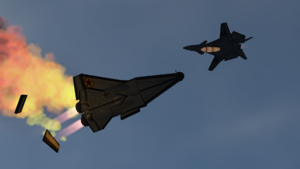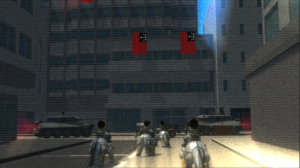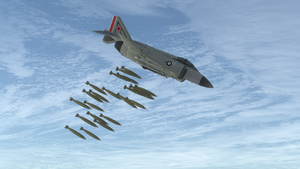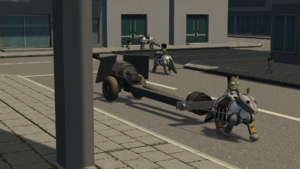Sahren Civil War
|
Sahren Civil War
|
|||||
|---|---|---|---|---|---|
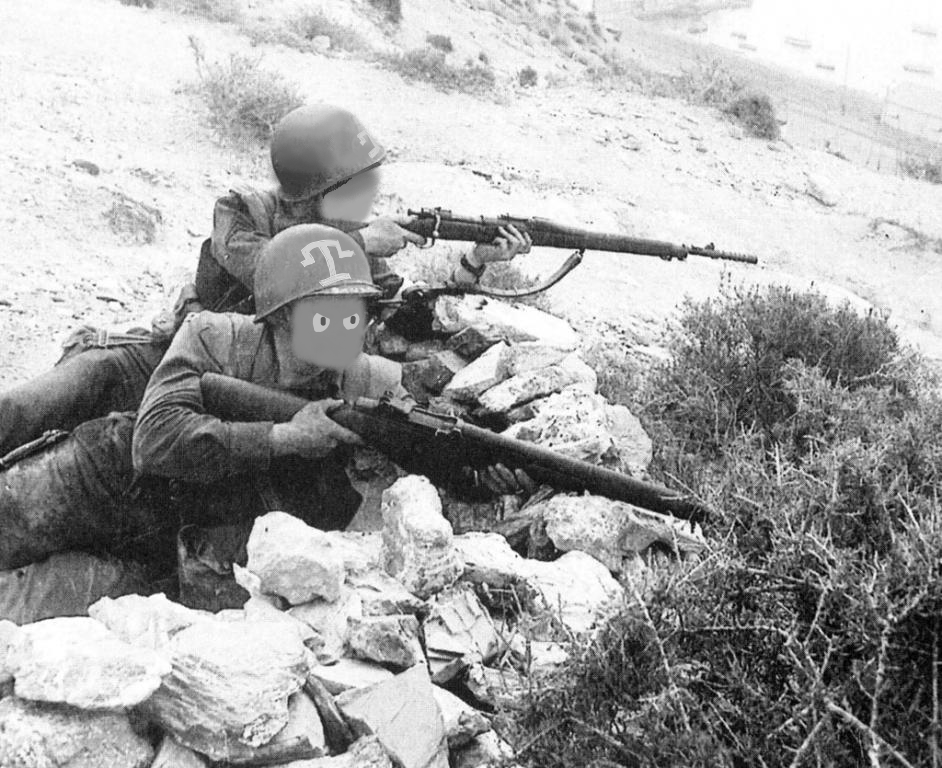 |
|||||
| Lavro Loyalist riflemen | |||||
| Period | |||||
| 2144 - 2146 | |||||
| Location | Sahr, Bastia | ||||
| Result | Mount Kyzets Accord | ||||
| Territorial Changes | Republican victory | ||||
| Belligerents | |||||
| Republican Coalition | National Salvation Coalition | Kralnovist Sahrland | |||
| Worker's party Lavro Loyalists Republican party |
National Salvation Party Strecha |
Labour Party Klensagrad Commune |
|||
| Strength | |||||
| [force_1_strength] | [force_2_strength] | [force_3_strength] | |||
| Casualties and Losses | |||||
| 60000~ | [force_2_losses] | [force_3_losses] | |||
The Sahren Civil War was a conflict fought in north Sahrland and Bastia between the years of 2144 and 2146. It was fought between the Republicans, National salvation party, and Labour party, and Sahren Military Junta along with the smaller groups that allied themselves with the larger groups. Sahren Chadastok was also independent for this period falling under the influence of the Orion Empire. Due to the tense yet peaceful geopolitical climate at the time, foreign involvement was limited. A majority of the world backed the Republican party as it was seen as the most legitimate, especially after Kirbo lavro's Dugthail puscht. The war has had many interpretations such as class war, proxy between kolusion and burric spheres, Sahren nationalism vs pan-Aontism, Socialism vs Syndicalism, State vs local government, and many more.
Background
From 2106 to 2139 the Sahren state was lead by a monarchy which entered a period of decline after Kirbo Lavro succeeded the throne, who was considered incompetant and unready to rule even by himself. Anti government activity from various groups and corruption lead to the government only really controlling more urbanised areas. The situation nearly caused a civil war as the groups began fighting eachother until the Chief of army Alekzander Kholsahr lead a successful coup in 2139 and declared a regency council. The Junta attempted to control the situation with little results. Crime was rampant, social injustices were common, and raiding to fund political agitation was constant.
Lead to War
The Pozhar Revolts of 2141 are considered the leadup to the Sahren Civil War. While most of the Sahren Royal Armed Forces were fighting in the Burr war, the Kralnovist Labour party led a chaotic revolution against the Junta. The rebels seized control of the capital but their advances were largely unsupported by artillery and aerial bombardment. Small unit counterattacks by forces loyal to the Regency Junta prevented a whole capture of Khosa, but it was surrounded and Slovale had completely fallen. Garrisons on the other major cities managed to hold off the Kralnovists. Operation Kerosene successfully recaptured Khosa and by 2142 the Sahren Stihlovist republic was crushed. The guerillas remained in the countryside to launch a new uprising when the time was right. While Operation Kerosene had unprescedented success, the bombardment it caused did not help the situation in Khosa and Slovale. By this point the lack of an unrivaled government meant the Navy (and by extension the Sahren expeditionary force) no longer knew who it took orders from. In late 2143 the Junta declared its support for south comer and celrapran against Ophir to preserve the balance of power in the region. The Junta had planned on Phoenia and other Kafrican nations joining in, but Sahrland fought nearly alone. The destruction of the SN indestructible and the later treaty of Cath caused a rapid growth in anti government activity. The Junta now only controlled the urban areas and their control in them was weak. Groups of partisans spent the rest of the year stealing supplies and weapons and fighting eachother in preparation for their uprisings.
Course of the war
The great return
The beginning of the war was caused by the Republican pary in exile which was in the Phoenian province of Kravsmad. The agreed time to begin the uprising with the Worker's party (which was officially merged) was 3 hours after midnight on the 17th of Kamprazdnóir, 2144. The Republicans were to cross the border on the 16th partially through bribery and partially through avoiding guards. The Lavro loyalists were also invited to join the Republicans but refused to do so before Dugthail was close to the front. Plans for the uprising were discovered by a Junta officer on the 15th and the plans had to be activated immediatly. The republicans seized control of Sys with minimal fighting. Crossing the border proved more difficult than thought, but many supplies and weapons got through. The labour party launched an uprising near Slovale followed by their anarchist allies in Klensagrad, which were joined by the defecting Junta garrisons. With the People's militia nearly at Slovale, the Strecha movement and National Salvation party united to take it first.
This rapid series of revolts left the Junta with only Dugthail, Khosa, and Slovale in their control. In theory they still controlled roughly 40% of the manpower and 70% of the aircraft, however the loyalty of these was doubted. Additionally, a majority of field commanders and even the general staff either defected, went missing, or were killed in the initial uprisings. The state of Junta governance was effectively nonexistant and instead consisted of small groups of soldiers or aircraft that were left unsupported and uncoordinated from eachother. By the 28th, the numbers of all sides combined had swollen to roughly 350,000 but would continue to wax and wane throughout the conflict.
Junta strength in Sahren Nuvastia was stronger than in Sahrland, resulting in the factions allied to their respective Sahren factions failing to make much success. Bastian labour party success on the territories nearing the Zokesian Confederation forced the Zokesians to take action and send 100 tanks and aircraft into the area which fought every army except the Republicans whom Phoenia and Zokesia wanted to place in control of the country.
Early action
Chadastok declared neutrality in the conflict on the 1st of Khelad and fell under the protection of the Orion Empire. The siege of Slovale began almost instantly as the Junta was not permitted to retreat and was crushed between the NSP and Labour party. On the 16th of Khelad Prince Kirbo Lavro led a bloodless Puscht in Dugthail after being promised hospitality by the Republicans. This action effectively stripped the regency junta of any legitimacy and secured Zokesian support. By the 18th the Labour party had seized control of most of Slovale trapping NSP forces in the city. Losses suffered by all sides were being more than replenished due to the influx of volunteer soldiers and defecting Junta forces. By the end of the month Phoenia pledged support to the Republicans as they were considered the most legitimate and most likely to build a stable government. The labour party launched offensives into Khosa to try to take control of the capital but only succeeded in taking a few suburbs. Junta forces at Khosa were the few veterans who were well trained. Zokesian armour successfully beat the Labour party in Bastia, causing Republican general Nedfry Svoboda to declare "Straitéis Bastiya", which detailed a focus on offensives in Bastia instead of Sahrland as the production capabilities of the region would be vital for the war of attrition the Republicans now had to settle in for.
Junta collapse
The Junta splintered apart and was beaten by the 21st of Nugoazhd, 2144. The regime still persisted in Nuvastia but was faced on the north by Republicans and NSP, the west by Zokesians, and the south by the Republicans at Salvacion. Regardless of the Straitéis Bastiya, Republican offensives into the east created a breakthrough that pushed all the way into Khosa. Labour party and NSP mounted fierce counterattacks which stalled the republican offensive at Klensagrad and in the north, but not before a large portion of the NSP and Strecha were pocketed at the Western Norian Steppe. The Western Steppe pocket inflicted many causalties on both sides as the NSP marched outside of the country and back in through the north and the Republicans tried to crush them to prevent it. In light of this operational failure the NSP began an offensive which caused a collapse of the Labour party flank and surrounded Slovale, which became home to the fiercest fighting of the war as the Labour party was being attacked from the trapped NSP in Slovale and the NSP surrounding Slovale.
Meálhtyk offensives
In Sahrland the Republicans prepared for a return to the static modern trench warfare until the Bastian front could be won. The NSP and Labour party began offensives that inflicted heavy casualties on all sides with little gain. In Nuvastia the months of Yablokuull and Meálhtyk saw the Republicans taking large swaths of territory in short time as the Labour party and NSP garrisons in Nuvastia collapsed. Stubborn resistance by Sahren Nuvastia were all that prevented Republican control. By Teince 2145 the Labour party was paralyzed in administration and taking severe casualties from the National Salvation party. The rift between the Anarchists in Klensagrad and the Labour party began to grow until the Klensagrad Commune declared its independence. On the 7th of Glapesch a portion of the Sahren Nuvastian Royal armed forces seized control of the government and began asking for terms from the Republicans. Continued offensives prevented any real response from anti-treaty forces of Sahren Nuvastia. By the 9th it became clear the only terms were unconditional, and Sahren-Nuvastia officially surrendered. Hearing word of the Anarchists in Klensagrad, a nearby Zokesian fleet bombarded the city and destroyed many anarchist positions for the Republicans, suffering heavy damage on one battleship.
Operation Tetraethyllead and Operation Heteroatom
- Main Article: Operation Tetraethyllead
- Main Article: 2nd and 3rd sieges of Slovale & Operation Heteroatom
By Yablokuull of 2145 the spare Republicans from Bastia arrived in Sahrland and launched two Operations ; Tetraethyllead which consisted of a strike into klensagrad and Heteroatom, a further strike up north into Slovale in an effort to end the war swiftly. The operations were to have the most artillery and air support yet seen in the war, similar to the levels seen in Operation Kerosene. The Anarchists inflicted heavy casualties on the Sahren Republican Guard but the city of Klensagrad was captured within 11 days of the offensive's start. Operation Heteroatom caused the Labour party and NSP to declare a temporary truce and form the united-front, but the damage to either side was already so much that the Republicans had superiority in artillery, manpower, coordination, intel, and air support. The united front was quickly beaten back and the NSP ordered a retreat into the Vagani region. The Within only 13 hours of Republicans entering Slovale, the last Strecha brigade in the city surrendered. Many Labour party and NSP troops got away, which would provoke the Vagani campaign. Others formed Guerillas which kept fighting until 2173. By all accounts, the civil war was over, and the Republicans declared it so.
Vagani Campaign
The Vagani Campaign was a continuation of the Sahren Civil War from 2146-2153. The war was fought between the United front and the Republican Guard. The conflict mostly consisted of skirmishes and guerilla warfare. The goal of the United front was to retreat and force the Republican Guard to battle tribesmen until the prolonging of the war caused a Republican collapse. The end result was the weakening of the United front into irrelevancy. Dissolvement of the Republican alliance did not occur because of state censorred media and that the Sahren Republican Militia was disbanded, allowing the population to get back to rebuilding the country. A superior base of supplies, air support, manpower, and fuel were the main causes of Republican victory.
Foreign involvement
Zokesia
Zokesian 1st Armored Corps struck west from Nuvastia in a security measure to establish a buffer zone from the Zokesian border. Airstrikes neutralized Sahren-Nuvastian troops on the ground and little air power was seen to resist the airstrikes from Zokesia and her allies. The strike force made 50 miles in the span of days, securing a wide swath of Bastia.
Zokesian support for the Republicans began after the Dugthail puscht and an agreement between Phoenia and Zokesia to avoid a proxy war. Concerns of the confederation were of the Zokesians in Bastia and installing a legitimate government in the region. The notable difference between Phoenian and Zokesian support was that Phoenia saw the Republicans as more legitimate as they sought to appoint a government through a democratic system similar to Phoenia, whereas Zokesia saw those loyal to Kirbo Lavro as legitimate and therefor the Republicans when the Lavro Loyalists joined the Republican alliance.
Phoenia
Phoenia was the first country to recognize the Republicans as the legitimate government in Sahrland, taking only 23 days from uprising start. Phoenian manufactured arms eventually accounted for 20% of Sahren infantry and dragoon equipment. A small number of phoenian aircraft also came into possession of the Republicans. The Phoenian navy's readiness to strike prevented any naval mutinies, which also had the effect of the navy simply being absorbed into the Republicans post war rather than the Republicans making their own naval branch.
Such drastic support of the Republican alliance was decided as they were seen as the most likely to implement a stable government. Ideological goals of the Republicans also opposed the militaristic goals of the National salvation party, which often consisted of military conquest of Egercian speaking territories and a dismantling of Aontan alliances.
Orion Empire
The Orion empire immediatly declared an exclusion zone around Sahren Chadastok as soon as the War began. Orion naval dominance prevented foreign powers from taking the city and trade in the region discouraged the empire from conquering the port.
Crytil
Crytil was the only country to recognize the National Salvation party and by 2145 escalated their involvement to include war material. Crytil was instrumental to keeping the NSP supplied with ammunition and air power. Distance between the two nations was a significant factor in the effectiveness of transport. The involvement of Crytil has caused many to interpret the war as a proxy between the Burric sphere and the Kolusion spheres.
Consequences
Casualties
Casualties are hard to estimate for the Sahren Civil War. Many surrendering soldiers were executed and their bodies hidden. A majority of these actions were under the orders of junior officers and had largely no relation to statewide persecutions. Many partisans also fought without being formally recruited into any side. The deaths of partisans are impossible to calculate. Many munitions were also used with subtle long lasting effects, most notably the Republican usage of firebombing and tear gas. To this day unexploded ordinance still exists in the Sahren countryside, causing a not insignificant amount of injuries and deaths every year.
Environmental effects
Many factions used chemical warfare during the war, the Republicans in particular making the most extensive use of it. Key chemical plants were built and existing ones converted to produce the chemicals needed for Fucsya, and gas masks were mass manufactured by all sides. Research and data analysis done in the 2162 revealed exposure to Fucsya used would cause long lasting respiratory effects, which shortened the lifespans of all effected. This news was suppressed until the 70s to avoid exacerbating the then ongoing Hysteria of 2160.
Low lying areas collected posions and made the ground heavily intoxicated, preventing the growth of all but the hardiest of plant life. Cities like Klensagrad needed their entire sewer system rebuilt as Fucsya was used in anti-partisan action. Several smaller towns needed to be entirely evacuated due to harsh Fucsya usage, never to be resettled again.
Woodlands were devastated by heavy artillery usage and cut down for resources, often becoming monocultural as post-war governments failed to reintroduce biodiversity during restoration projects. Trench systems covered the landscape and abandoned military equipment can still be found all over rural parts of the nation.
As soon as the war ended, Poppies, Chrysanthemums, and Kalinas sprouted all across the former battlefields, as the churned up soil introduced new nitrogen while killing competition. These flowers became symbols of peace in the coming years.
Economic effects
During the civil war expendatures of all sides tripled. Strategies to financing the war were similar across all factions, mostly being creation of new money rather than increased taxes or debt. This complicated things as the Rut was tekkian in origin. The Republicans, NSP, Labour party, and Junta created their own currencies which were only backed by their governments. Republican money creation was ony slightly higher than production growth rate which was helped by the gradual increase in dense territory controllled. The Labour party on the other hand did not have control of much densely populated territories, which lead to them having by the end of the war three times as much inflation as the Republicans. Labour party suffered from inability to collect resources due to the paralyzed governing of Klensagrad. Effectively until the end of the war every faction was using two different types of currency. Many arms purchases were completed using gold or silver instead of actual currency as it was the only way the seller could obtain payment that would be worthwhile.
Fuel shortages began almost as soon as the war began as imports were limited and production was nearly nonexistant. Gas rationing was implemented in cities along with many vehicles having gas stolen. Mechanized farming equipment was replaced with capal-drawn counterparts. Republicans in Bastia had access to Phoenian and Zokesian oil imports but fuel was harder to import into Sahrland as it had to come over land from Wuste and Iroa and across Phoenia. Dragoon brigades did not suffer from fuel shortages.
Food shortages were rampant as not only was a majority of the population in or effected by the military, but production of new equipment was halted. Food prices multiplied and all factions began to force farmers to sell their stock at incredibly low rates. War communism in particular effected farmers the most, but this was a policy only pursued by the Labour party and Klensagrad Commune. Exports ended a few months prior to the war's beginning. Although Tekkia was affected, they had time to prepare and could rely on the rest of Egercia to make up for it.
Republican Repression
The Republicans implemented media censorship during and after the war, however post war were gradually loosened until censorship were abolished in the 2160s. Labour party partisans were referred to as "Fælons" (literally translates as "Bandits") to remove any political connection from them. The SRGIA conducted manhunts for significant leaders from the civil war who fled into other countries, leading to a number of assasination attempts.
